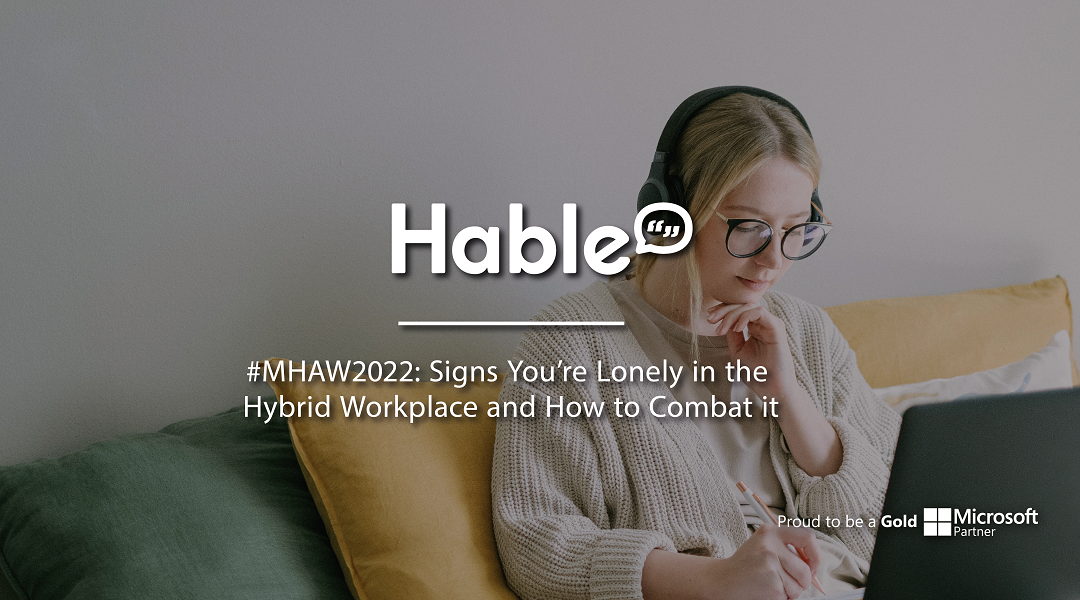
Loneliness is the theme for Mental Health Awareness Week 2022, focussing on the impact that being lonely can have on our mental health and how we can combat it. Whether you’re still going into the office a few days a week, or now spending most of your time at home, it’s crucial to ensure that you’re looking after your mental health. If you’re experiencing feelings of loneliness and isolation while hybrid working, you’re not alone; over 70% of employees have admitted to experiencing loneliness whilst hybrid working.
But, how can you spot the signs of loneliness and how can you combat this? Let’s look at some tips, including how technology can help.
5 Symptoms of Loneliness in the Hybrid Workplace
Loneliness is a universal experience; we all know what it feels like, whether we’ve felt it from time to time or it’s become a more prominent feeling in our lives. Loneliness is a tool that has evolved with us, much like hunger or thirst, to increase our likelihood of survival.
You might think it’s hard to feel lonely with a few days in the office here and there and back-to-back meetings on Microsoft Teams, however this type of human connection is new for us; we’re typically used to being more sociable than this.
Here are some of the symptoms of loneliness that you may start to experience in a hybrid workplace:
1. Lack of motivation at work
It's quite common to see a decrease in motivation at work. You might feel like despite having a full to-do list, you don’t have any energy or desire to get things done.
2. Getting stressed out easily
We all get stressed from time-to-time, and workplace stress continues to be a major health concern in the UK. A study that analysed research from across a 40 year period showed that feelings of social isolation and loneliness can lead to an increase in stress hormones in the body.
3. Feeling tired and lethargic often
Often experiencing fatigue and tiredness – perhaps despite getting a good night’s sleep – can be an indication that you’re lonely or isolated. Studies have shown a strong link between loneliness and lack of good quality sleep, with those who are lonely far more likely to experience sleep fragmentation.
4. A tendency to get sick
In a period of isolation, you might become more susceptible to illnesses. This is due to changes in the body that weaken the immune system and increase inflammation in the body.
5. Experiencing burnout
Burnout is what happens after a prolonged period of immense pressure at work, and is often a result of combination of both physical and mental stress. Interestingly too, chronic loneliness and burnout have similar symptoms: fatigue, illness, and stress.
How to Combat Loneliness While Hybrid Working
Loneliness is completely normal, and something that everyone has experienced at some point in their lives. You can’t get rid of a problem by ignoring it and pushing it aside, but when you have identified the symptoms, you can work towards overcoming them. Here are our 10 top ways to combat loneliness while at work:
- Schedule some time to chat to a colleague on Microsoft Teams (or other video call platform) about something that isn’t work related, to help make those important human connections.
- Create an interest group with your colleagues to meet new people with similar interests, whether that’s a book club, film club, or fantasy football league. You could all use Yammer to stay connected and post updates.
- Make a plan to meet, either with a colleague or friend, in person and work together for the day at a coffee shop or coworking space.
- Use the Praise feature in Microsoft Teams to show your appreciation for another colleague and drive positive workplace culture; this can also help to foster fantastic workplace relationships.
- Create a virtual commute so you start off your day right. You might spend the time catching up on daily chores, meditating or taking time to read - anything that relaxes and puts you in the right frame of mind.
- Go into the office with a purpose. If you know other people from your team are going to the office on a certain day make time for a lunch or coffee with colleagues.
- Play background sounds when working from home with the radio, an uplifting playlist or podcast. You can also find café recordings online, which replicate the feeling of being in a bustling café.
- Use the Focus Assist feature to avoid distractions, reduce notifications and prevent burnout.
- Access the Inspiration Library within Microsoft Viva Insights, where there is an entire catalogue of videos on various topics to help inspire, motivate and connect you.
- Join a virtual coworking space; a great alternative to in-person working. Virtual coworking can be done either with the colleagues at your company, or with remote workers from around the world. It takes the coworking concept and makes it virtual, and can be a fantastic solution for people who like the company of others while they’re working.
Click the links below to find support and advice on managing mental health:

